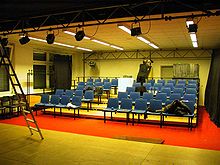Brondby High School
| Brondby School | |
|---|---|

|
|
| type of school | Integrated secondary school |
| School number | 06K04 |
| founding | 1975 |
| address |
Dessauerstrasse 63 |
| place | Berlin-Lankwitz |
| country | Berlin |
| Country | Germany |
| Coordinates | 52 ° 25 '43 " N , 13 ° 20' 45" E |
| carrier | State of Berlin |
| student | 1025 (2017/2018) |
| Teachers | 87 (2017/2018) |
| management | Nina Hauer |
| Website | www.broendby.de |
The Bröndby School is an integrated secondary school with upper secondary school in the Steglitz-Zehlendorf district, Lankwitz district , of Berlin .
history
The Brondby School was opened in 1975 at Dessauerstr 37-39 and named in 1976 after the Copenhagen suburb Brøndby . It is one of the first comprehensive schools that were decided in the course of the great social democratic educational reform in the 1960s and 70s.
The original school building had to be closed due to asbestos pollution in 1990, like many similar schools. On the grounds of the current building at Dessauerstraße 63 there was the school's sports field and three tennis courts, which were used by the neighboring tennis club Postsport Verein (today: Pro Sport 24 eV) for youth training. The current school building was intended as a temporary measure for a few years until the original building would be renovated. After the fall of the Berlin Wall and reunification in 1989/90, however, the renovation was postponed indefinitely. In 2000 the building was finally given up due to the budgetary situation of the State of Berlin and the poor condition of the building due to vacancies.
Development of the former school grounds (Dessauerstr 37-39)
In 2009 the Liegenschaftsfonds Berlin was commissioned with the sale of the property along with the asbestos-contaminated ruins, on which only residential construction is permitted, but unsuccessful due to the high demolition costs. After numerous failed attempts by the real estate fund to find an investor for the site, it was given to the municipal housing company Degewo as a contribution in kind at the end of 2013 . After the building had been completely gutted down to the load-bearing concrete frame, it was demolished between February and September 2016. A development plan procedure for the site began in March 2017 . In the project-related development plan decided on and officially announced in 2016, “an urgent overall interest of Berlin” for the construction project was identified. Nevertheless, the start of construction originally planned for mid-2017 will be postponed "probably in 2019". According to a media report from the beginning of May 2019, which relies on information from Degewo, “public participation is complete”, so that construction can begin as soon as “the development plan for the development of the residential area has been approved and formally established by the district office” be. The construction project is to include a total of 260 rental apartments with one to five rooms in mostly four-story houses, a day-care center for around 60 children and around 100 parking spaces. The completion of the new residential area is scheduled to take place in December 2021 and the first occupancy from January 2022.
The current building
The main building faces Dessauerstraße and borders Gallwitzallee in the east. Core group rooms and administration rooms face Dessauerstrasse. The natural science rooms face Gallwitzallee . In the south, the property is bordered by residential buildings from the 1950s. In the middle is a green inner courtyard, which offers a harmonious backdrop for animals and people through its pond. To the west of the building is the gymnasium, which went into operation together with the actual school building in 1975, but, unlike the main building, was renovated early on. It offers space for 5 classes. Behind the sports hall is the sports field .
organization
The Bröndby-Oberschule is organized in different departments. Many departments have their own staff room. Since 2014, the school has been offering three profiles with reinforced teaching in the areas of technology, economics, arts and sports.
Department of Economics - Work - Technology
The Faculty of Business - Work - Technology (WAT) aims to prepare students for their future training . From the 7th grade onwards, the students learn how to use the media. Furthermore, you will learn how to create technical drawings and understand symbolic languages using drawing boards. In the ninth grade, the department organizes the three-week internship for the students. In the tenth grade, as many students are about to graduate, the Vocational Training Act is dealt with.
Faculty of Science
The natural sciences department comprises the subjects of biology , physics and chemistry . In addition, particularly interested middle school students can choose the natural sciences elective. In the upper level, the profile courses or advanced courses in biology, chemistry and physics are offered. A total of 24 teachers work in this department. Work takes place in 13 large rooms, each with space for 24 students. Student experiments can be carried out directly at the student's seat. A water connection, gas connection and several sockets are available for every two students. Each room has a television with a DVD player.
Languages department
The school offers particularly high-performance and language-interested pupils whose first foreign language is English an increased English or English-language teaching in biology (German-English train) in the intermediate level; a continuation in the upper secondary school is aimed for. Pupils who opt for this bilingual train will receive two additional hours of English lessons in the 7th and 8th year in addition to their compulsory weekly English lessons. These classes aim at the highest level of ability, which is why good to very good grades in English and at least satisfactory grades in biology are prerequisites for admission to the bilingual train. In the 9th and 10th year, the subject of biology is then taught in English. The elective course in English Literature and Regional Studies is compulsory.
Performing Games Department
Performing games (DS) have been offered in schools since 1977. The Bröndby-Oberschule was the first school in Berlin to offer the school subject DS. During the 1980s, DS developed into a recognized educational focus of the Bröndby High School. Since 1990 there have been ten theater courses permanently:
- in lower secondary level: two courses per year.
- in upper secondary level: one basic course each in grades 12 and 13.
canteen
The school cafeteria is on the ground floor. It not only serves as a lounge area for the students, but is also a room that can be used universally. Festive events such as anniversaries or general teacher conferences take place here on a regular basis. Here, students can purchase items for daily needs (from handkerchiefs to complete lunches).
Media library
A few years ago the media library was a city library , but it was converted into a media library. It is one of the largest rooms in the building and is therefore often used for writing exams and for various conferences.
Extra-curricular area
The Brondby School is an all-day school, i. In other words, lessons last until 3:30 p.m. except on Wednesdays. The secondary level I pupils stay in the “extra-curricular area” (AUB) during the non-teaching period, where they are looked after and advised. To this end, the school provides educators and social pedagogues who make numerous offers for recreational activities and opportunities to talk. So there are z. B. a workshop in which woodwork or silk painting can be done in groups.
The material and work equipment required for this are partly financed by the proceeds from the sale of the products at the school bazaar. There is also a tea room in which the students can stay without the constant presence of an educator or social worker. Here you can 'hang out' and listen to music. In addition, there is also a computer room in the AUB. B. Graphics can be created for school activities. A TV and film room offers the opportunity to watch films with teachers. The most popular room within the AUB is the table tennis and billiards area.
An important task of the AUB's educators and social workers is to advise students in conflict situations. Some of the employees are trained in mediation and regularly pass this knowledge on to interested students in workshops or courses. In the event of problems between students, these can be discussed and resolved in a separate room, either among the affected students with a student mediator or in the presence of an adult mediator.
Namesake
The school was named after the town of Brøndby in Denmark .
The first contact between Brøndby and the Steglitz district was in 1962. On November 9, 1968, the partnership agreement was signed. The name was changed from the simple written form to "Bröndby" (German). After the Steglitz-Zehlendorf merger, the Zehlendorf town twinning association visited Bröndby for the first time in 2002 on the occasion of a citizens' trip on the way to the Swedish twin town of Ronneby.
In 1964 the first youth group from Bröndby came to Steglitz and were housed in private quarters. This was followed by encounters between school classes, athletes, youth music groups and student guides, as well as an exchange between young Steglitz and Brondby service staff. The politicians also kept lively contacts. In 1964 a path in the Steglitz city park was named "Bröndbyweg". In 1969 the streets 79, 81 and 78 in the district of Lichterfelde were given the name "Bröndbystraße" and in 1976 the name of the "Bröndby-Oberschule" took place.
Individual evidence
- ↑ a b c d school directory. In: berlin.de. January 18, 2017, accessed February 10, 2018 .
- ↑ Eyesore can still be bought. Little interest in the earlier Brondby School building. In: Berliner Woche , Volume 29, No. 47, November 23, 2011.
- ↑ Anett Kirchner: We are amazed at the location for refugees ourselves. In: Der Tagesspiegel . December 5, 2014, accessed February 10, 2018 .
- ↑ Karla Rabe: An eyesore disappears . In: Berlin Week . ( berliner-woche.de [accessed on February 7, 2018]).
- ↑ Karla Rabe: Degewo builds apartments on a former schoolyard . In: Berlin Week . ( berliner-woche.de [accessed on February 7, 2018]).
- ↑ Michael Graupner: 250 apartments were to be built in Berlin-Lankwitz - but the excavation pit has been abandoned . In: Der Tagesspiegel , December 11, 2017, accessed on February 20, 2018.
- ↑ Karla Rabe: Delay in housing construction on Dessauer Strasse . In: Berliner Woche , January 18, 2018, accessed on February 20, 2018.
- ↑ Karla Rabe: Green light for new apartments: Degewo housing project in Dessauerstraße is set to start this year . In: Berliner Woche , May 1, 2019, accessed on May 4, 2019.


